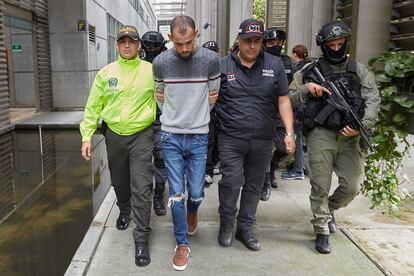Murder of Paraguay prosecutor Marcelo Pecci shows international crime links
Colombian police say the plot was coordinated by a Brazil gang named PCC and that the perpetrator was likely a Venezuelan national. The hitmen were allegedly paid $500,000


The murder of Paraguayan prosecutor Marcelo Pecci while he honeymooned on one of Colombia’s Caribbean islands has exposed collaboration between crime organizations across the continent. Five people have been arrested for the May 10 murder on the resort island of Baru, just 45 minutes from Cartagena. Colombian authorities say they are pursuing a sixth suspect.
“The suspect still at large is Gabriel Carlos Luis Salinas, and we believe he has fled to Venezuela,” said General Jorge Vargas, who heads the Colombian police force. Vargas announced that Interpol has issued a notice for his capture. “Although we don’t collaborate much with the Interpol office in Venezuela, we have requested their assistance in finding and arresting Salinas.” Vargas has led the joint effort by Colombian and Paraguayan police.
Five suspects were arrested in Medellin, including the man accused of shooting Pecci three times as he dismounted from his jet ski. The initial interrogations of these suspects began to reveal information about the masterminds behind the homicide. “There are indications that an international criminal network coordinated by the [Brazilian gang] First Capital Command (PCC) formulated the plan to assassinate prosecutor Pecci,” said Vargas.
Paraguay is the region’s largest marijuana producer and the most important route for moving cocaine from Bolivia to Europe. Bolivian coca is mixed in Paraguay with precursor chemicals that are illegal in other countries. The product is then concealed in trucks and shipping containers that are later transported to Africa and Europe. According to Paraguay’s anti-drug agency (SENAD), Cape Verde off western Africa and Rotterdam in the Netherlands are the main destination ports.
Paraguay has therefore attracted a wide range of criminal organizations in recent years, and Pecci was the top prosecutor in charge of several of the country’s most important drug trafficking and money laundering cases. One of Pecci’s main targets was Brazil’s PCC, one of the most powerful mafias in South America and a major player in the border cities of Pedro Juan Caballero and Ponta Porã, hotspots of international drug trafficking.
“We continue to work hand-in-hand with the US Drug Enforcement Administration (DEA), which has provided us with critical intelligence. The Pecci murder could be related to global drug trafficking, but we can’t rule out radical terrorists,” said Vargas.
Pecci had investigated Hezbollah in the past, and in 2019 he handed Lebanese national Nader Mohamad Farhat over to the DEA for extradition to the US to face money laundering charges in Florida’s Southern District [federal] Court. Pecci’s investigation included Mahmoud Ali Barakat (extradited in 2018) and Kassed Mohamad Hijazi, a Brazilian citizen of Lebanese origin. Pecci was part of “A Ultranza Py,” a major operation against cocaine trafficking and money laundering; he investigated the murder of businessman Mauricio Schwartzman and led the San Bernardino investigation into the murder of a model and an alleged criminal at a music concert attended by more than 20,000 people.
Like Colombia in the 1980s and 1990s, narco-politics is now a widespread scourge in Paraguay. “It’s very hard to find a case that doesn’t involve a politician. Several of the cases brought by Pecci involved politicians who are now in prison,” said Juan Martens Molas, a criminology expert and director of INECIP, a non-profit organization that promotes and defends human rights in Paraguay’s criminal justice system.
Former soldier among those captured
The first court hearing for the detained suspects revealed that they were paid the equivalent of US$500,000 for Pecci’s murder, and that the plant was finalized in an outdoor market in Envigado, a city near Medellín. The alleged assassins also used social media to track down Pecci. Colombian Attorney General Francisco Barbosa said, “The criminals got lost a number of times, but managed to locate Pecci and his wife from their social media posts.” Instagram photos of the couple revealed details of their honeymoon trip and that they were expecting their first child.
Barbosa claims that more than 200 pieces of evidence, including 2,500 hours of video footage, 67 intercepted messages, and other communications between the suspects, have produced an airtight case against the defendants. Four of the five detained suspects have pleaded guilty to the charges. Only Francisco Luis Correa Galeano, considered to be the mastermind of the crime, has refused to plead guilty. “We know that Correa planned the whole operation with the hitmen he brought to Cartagena,” said Barbosa.
The other suspects under arrest are alleged triggerman and Venezuelan national Wendre Still Scott Carrillo; Eiverson Arrieta, allegedly responsible for transportation; and Marisol Londoño and her son, allegedly in charge of surveillance.
A former soldier, Correa is a Colombian national who has served two prison sentences, including one for sexual abuse, and belongs to a criminal organization called “Los Paisas.” He was arrested carrying a 9mm pistol, cash, and payment receipts. His arrest brought to mind the participation of former Colombian soldiers in the assassination of Haitian President Jovenel Moïse. Whether Correa will cut a deal with the prosecution is still unknown, but his testimony would be key to identifying who ordered Pecci’s murder.
Tu suscripción se está usando en otro dispositivo
¿Quieres añadir otro usuario a tu suscripción?
Si continúas leyendo en este dispositivo, no se podrá leer en el otro.
FlechaTu suscripción se está usando en otro dispositivo y solo puedes acceder a EL PAÍS desde un dispositivo a la vez.
Si quieres compartir tu cuenta, cambia tu suscripción a la modalidad Premium, así podrás añadir otro usuario. Cada uno accederá con su propia cuenta de email, lo que os permitirá personalizar vuestra experiencia en EL PAÍS.
¿Tienes una suscripción de empresa? Accede aquí para contratar más cuentas.
En el caso de no saber quién está usando tu cuenta, te recomendamos cambiar tu contraseña aquí.
Si decides continuar compartiendo tu cuenta, este mensaje se mostrará en tu dispositivo y en el de la otra persona que está usando tu cuenta de forma indefinida, afectando a tu experiencia de lectura. Puedes consultar aquí los términos y condiciones de la suscripción digital.








































